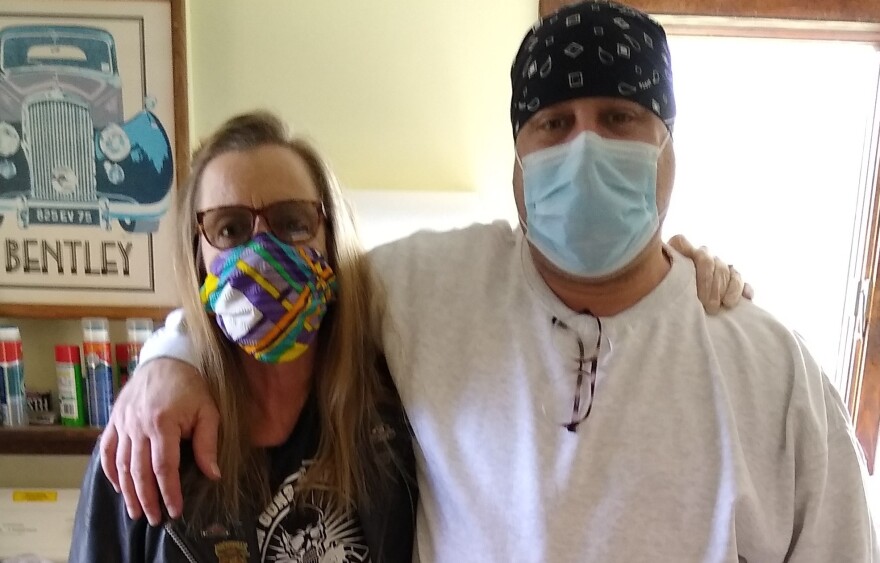Life at the Allegheny County Jail in the time of coronavirus is marked by fights over phone time, frenzied cleaning efforts, and tight quarters, according to a man who was freed from the facility just days ago.
“It’s terrible in there. I don’t even know where to begin and where to end,” said Michael Broglie, who was released from the jail Wednesday after serving more than nine months for a federal drug-conspiracy offense.
“It’s a scary situation,” Broglie said. “All day, every day, that’s all you would hear about is this COVID-19, and people want to go home to their families. And they’re worried about getting [the disease]. You could say that’s a death sentence.”
Broglie said jail staff were doing what they could to protect prisoners and themselves from the virus. The jail provided bleach, hand sanitizer, and masks while also mandating extra disinfecting.
"We would bleach about maybe 10 times a day," said Broglie, who had a job cleaning the facility. "We'd wipe the seats down, wipe the door handles. We just did the best we could."
Broglie said jail staff were also "doing the best they can. But still, it ain’t good enough," as long as prisoners are in close quarters.
“They talk about social distancing. But how are you supposed to do that when you’ve got two guys in a cell?” Broglie asked.
“Essentially, you’re sleeping in your bathroom with two men,” he added, referring to the fact that shared cells consist of two beds, a toilet, and a sink, and do not give cellmates enough room to keep the recommended minimum of 6 feet away from one another.
Since Broglie’s release, two more inmates at the county jail have tested positive for the coronavirus, for a total of six inmates and two jail employees.
Infection rates behind bars far outstrip those in surrounding communities. For example, 78 percent of people incarcerated at the Marion Correctional Institute in Ohio had tested positive for the coronavirus Wednesday. Inmates at New York City’s Rikers Island Jail, meanwhile, were six times more likely Wednesday than other city residents to have contracted the virus.
Broglie, 51, noted that he stands a heightened risk of succumbing to the coronavirus because of his age and high blood pressure. And he added, “There’s a lot of guys in there [who have] respiratory problems, high blood pressure, bronchitis, asthma.”
Inmates’ fears of getting sick, Broglie said, are compounded by increased restrictions aimed at limiting transmission of the virus. He said people housed at the jail are now permitted just one hour a day outside their cells, and that recreation time has been curtailed.
“Right now, you got all these guys cooped up … They’re in their cells for 23 hours a day. They’re going stir-crazy,” Broglie said.
He said that when prisoners are let out of their cells in groups of 10, they fight over the four phones available to them.
“Everybody’s miserable,” Broglie noted. “It’s a zoo down there.”
In an effort to head off virus transmission, local and state officials had freed close to 1,100 people from the Allegheny County Jail as of Monday. But for federal prisoners housed in the facility while they await trial, the odds of being freed are much longer. In western Pennsylvania more broadly, federal judges had granted just two of 46 release requests filed by court-appointed attorneys as of Wednesday, according to the region’s Federal Public Defender’s Office.
Twelve of the 46 were still pending. But government lawyers had opposed 44 of them, consenting only to the two requests that judges ended up approving, the federal defender's office said.
Broglie had pleaded guilty for a sentence of eight to 14 months, meaning he could have been released as early as mid-March, when officials began to launch efforts to encourage social distancing and combat the coronavirus. But he wasn't scheduled for a hearing until July. Following a 90.5 WESA report last week highlighting Broglie’s case, U.S. District Judge William Stickman agreed to reschedule Broglie’s sentencing hearing to this past Tuesday. The judge ultimately allowed the defendant’s release by ordering a sentence of time served.
Broglie said while he was still incarcerated, he recognized that “none of the federal guys were leaving.” But he said he had little sense of who else might have been released, because jail officials had decided to consolidate inmates onto fewer floors.
“Where we were at, it didn’t seem like anybody was leaving there,” Broglie said. “They were bringing guys in from downstairs straight to our block. They were moving guys from other blocks onto our block. Everybody’s like, ‘What the hell is going on here?’”
Jail officials have said the tactic is meant to clear certain levels of the facility for inmates who test positive for the virus and must be quarantined. But the arrangement has drawn criticism from prison-reform advocates as preventing social distancing. Three inmates sued the county and its jail warden, Orlando Harper, over such conditions earlier this month.
Although Broglie was relieved when he found out Tuesday that he would be going home, he said he made a point not to gloat.
“All the guys were happy for me, but I didn’t want to rub it in their face that I was happy,” he said. “So I just played it off like I’m just happy to get out of here. But I wouldn’t say much about it because them guys are stuck there, and that’s not the place to be right now.”




